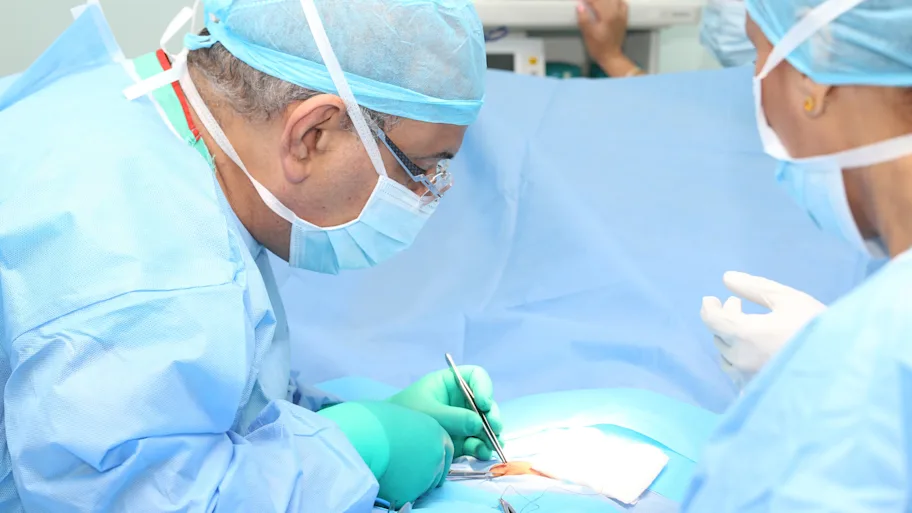
- Science news
- Health
- Surgery field growing due to continuous reinvention process
Surgery field growing due to continuous reinvention process
Frontiers Science Hero: Ferdinand Köckerling from Frontiers on Vimeo.
Prof. Ferdinand Köckerling has been from very early onwards in his medical studies captivated by surgery. “It is a combination of intellectual and handicraft capabilities, and you can see the immediate success of what you are doing. That fascinated me very early in my career and that is when I decided to become a surgeon,” he said.
Prof. Ferdinand Köckerling is an associate professor of surgery and a department head at the Vivantes Hospital in Berlin, more specifically at the Academic Teaching Hospital of Charité Medical School. He works in the department of Surgery and Center for Minimally Invasive Surgery. He is also the Field Chief Editor of Frontiers in Surgery.
Technological innovations in surgery
One of the highlights of Köckerling’s clinical career was his involvement in the development of minimally invasive surgery. Over the years, he pursued a lot of studies in the field and has been at the forefront of innovation. He says in surgery there are many innovations every day and it is difficult to follow these innovations by doing randomized trials. “There is a high need for registries in the surgery field in order to immediately document what you are doing with your new procedures,” Köckerling said.
Because of these new procedures and innovations, the field is growing quickly. Patients want to have interventions in their bodies that don’t result in scaring or incisions. The least invasive the surgery is, the better it is received – and as technology and techniques advance, so do these surgical procedures. “It is a never ending development in the invention of medicine. At the moment no one knows where this will end up in the next years,” he said.
In order to keep up with these changes and innovations, scientists (including surgeons) attend conferences, require good instructors and regular courses, but they also need professional medical journals to allow scientists to publish their new ideas.
Köckerling says research is not something that can be done by a single person. It needs a huge team to quickly collect the massive amount of data. This data is necessary as it provides answers on new procedures. The research also requires resources to make it possible and this sometimes an issue as the competition for money is high. “Traditionally surgery is not very successful in getting official research money worldwide as other disciplines do more basic research. Basic research tends to be more supported than the type of research we do in surgery,” Köckerling stated.
Tracking hernias through a registry
Even with the struggles for resources, Köckerling has been able to beat the odds and has been successful in starting a hernia registry. The goal of his registry is to document all hernia cases done in a hospital or in private practice – not just the number of surgeries performed but precisely documenting what has been done. “Having the registry will allow us to have access to a large collection of patient data that we can go back to in order to try to answer important questions in that field,” Köckerling explained.
There are many minimally invasive surgeries being conducted, but the Hernia one of the most common. In Germany, over 350 000 surgeries are performed a year, and in the United States there are more than a million cases per year.
The registry enables surgeons to make life saving decisions. “We answer questions such as what is the best technique for repair in, for instance, inguinal Hernia. Is the answer an open technique or an endoscopic technique? We can answer that question based on the over 250,000 cases we’ve collected through the registry. We now know that endoscopic technique repairs have certain advantages concerning pain for example,” Köckerling said.
There have been a lot of innovations such as different fixation devices for the mesh or products to seal the mesh into the body. Thus, surgeons have a variety of different procedures and approaches to solve the problem. This, according to Köckerling, makes it so difficult to answer all the relevant questions and that is why there is a need for high numbers of documented patient cases in order to have the chance to get an answer and to follow up with the patient.
Currently, the Hernia Registry is active in Germany, Switzerland and Austria. “There are other registries out there in the medical field. Scandinavia has one that is impressive, and other countries now want to join the registry initiatives,” Köckerling said.
You can follow the work of Ferdinand Köckerling on the Frontiers Research Network.
Selected publicationsBiological meshes for inguinal hernia repair – review of the literature
How long do we need to follow-up our hernia patients to find the real recurrence rate?
Is pooled data analysis of ventral and incisional hernia repair acceptable?






